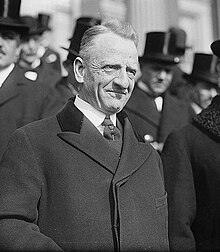
Back كارتر قلاس Arabic کارتر قلس AZB Картэр Глас Byelorussian Carter Glass Danish Carter Glass German کارتر گلس Persian Carter Glass French קרטר גלאס HE Carter Glass Hungarian カーター・グラス Japanese
Carter Glass | |
|---|---|
 | |
| President pro tempore of the United States Senate | |
| In office July 11, 1941 – January 3, 1945 | |
| Preceded by | Pat Harrison |
| Succeeded by | Kenneth McKellar |
| Chair of the Senate Appropriations Committee | |
| In office March 4, 1933 – May 28, 1946 | |
| Preceded by | Frederick Hale |
| Succeeded by | Kenneth McKellar |
| United States Senator from Virginia | |
| In office February 2, 1920 – May 28, 1946 | |
| Preceded by | Thomas S. Martin |
| Succeeded by | Thomas G. Burch |
| 47th United States Secretary of the Treasury | |
| In office December 16, 1918 – February 1, 1920 | |
| President | Woodrow Wilson |
| Preceded by | William McAdoo |
| Succeeded by | David F. Houston |
| Chair of the House Banking Committee | |
| In office March 4, 1913 – December 16, 1918 | |
| Preceded by | Arsène Pujo |
| Succeeded by | Michael Francis Phelan |
| Member of the U.S. House of Representatives from Virginia's 6th district | |
| In office November 4, 1902 – December 16, 1918 | |
| Preceded by | Peter J. Otey |
| Succeeded by | James P. Woods |
| Member of the Virginia Senate from the 20th district | |
| In office December 6, 1899 – November 4, 1902 | |
| Preceded by | Adam Clement |
| Succeeded by | Don P. Halsey |
| Personal details | |
| Born | January 4, 1858 Lynchburg, Virginia, U.S. |
| Died | May 28, 1946 (aged 88) Washington, D.C., U.S. |
| Political party | Democratic |
| Signature | |
Carter Glass (January 4, 1858 – May 28, 1946) was an American newspaper publisher and Democratic politician from Lynchburg, Virginia. He represented Virginia in both houses of Congress and served as the United States Secretary of the Treasury under President Woodrow Wilson. He played a major role in the establishment of the U.S. financial regulatory system, helping to establish the Federal Reserve System and the Federal Deposit Insurance Corporation.
After working as a newspaper editor and publisher, Glass won election to the Senate of Virginia in 1899. He was a delegate to the Virginia Constitutional Convention of 1902, where he was an influential advocate for segregationist policies. Historian J. Douglas Smith described him as “the architect of disenfranchisement in the Old Dominion.”[1] He also promoted progressive fiscal and regulatory reform but these contributions were often superficial since Glass generally opposed the most reformist aspects of federal legislation and was a New Deal critic.[2] Glass won election to the United States House of Representatives in 1902 and became Chairman of the House Committee on Banking and Currency in 1913. Working with President Wilson, he passed the Federal Reserve Act, which established a central banking system for the United States. Glass served as Secretary of the Treasury from 1918 until 1920, when he accepted an appointment to represent Virginia in the United States Senate. Glass was a favorite son candidate for the presidential nomination at the 1920 Democratic National Convention.
Glass served in the Senate from 1920 until his death in 1946, becoming Chairman of the Senate Appropriations Committee in 1933. He also served as president pro tempore of the Senate from 1941 to 1945. He co-sponsored the 1933 Banking Act, also known as the Glass–Steagall Act, which created the Federal Deposit Insurance Corporation and enforced the separation of investment banking firms and commercial banks. An ardent supporter of states' rights, Glass opposed much of the New Deal and clashed with President Franklin D. Roosevelt over the control of federal appointments in Virginia.
© MMXXIII Rich X Search. We shall prevail. All rights reserved. Rich X Search